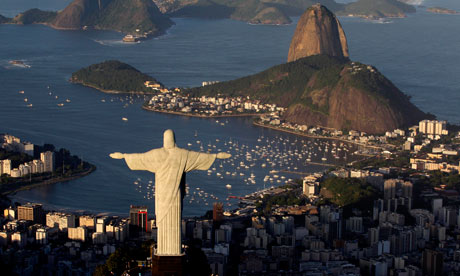Growing Demand in Brazil Beckons Big Pharma
Forget China. The cats in Brazil are getting fatter and global drug manufacturers want a share in the spoils. With retail pharma figures reaching $24.8 billion last year, Brazil is beginning to look a lot more attractive than its highly regulated Eastern counterpart.

Expected to become the fourth biggest global pharmaceutical market by 2016, Brazil currently leads the Latin American region , and is the second largest only to China among emerging markets. The country’s rapidly growing middle class (presently 120m strong), low national debt, improved business regulations and government's expansion of health care have enticed pharmaceutical companies to go West (or indeed south).
Over the past three decades, the US, the UK and many other parts of the industrialised world have experienced a widespread problem with obesity. Developing economies – Brazil among them – have more recently and rapidly witnessed a significant rise in unhealthy bodyweight among their population also.
While the economy in Brazil has become more stable, Brazilians are now facing the backlash of wealth with reports of high numbers of the populace suffering from obesity and other apparent ‘diseases of affluence’ – namely diabetes and cancer. Subsequently, Brazil’s healthcare spending has reached almost 8 per cent of GDP and the demand, and requirement, for pharmaceutical products is continuing to grow steadily. This development (nay, opportunity) has not gone unnoticed among the world’s top pharmaceutical companies – a relatively thriving economy with a need for medicine sounds like the perfect location for many an ambitious drug firm.
Getting access
But the attraction of expanding to emerging regions is always met with a modicum of hardship when the reality of entry is addressed. Pricing pressure, red tape and strong local competition mean that partnering up with or acquiring a local player is often the best way to get into the Brazilian drug market. Last year, Merck announced a partnership with two Brazilian drugmakers, Supera Farma Laboratórios and Eurofarma, to sell and distribute its drugs in Brazil.Furthermore, in February this year, US drugstore chain CVS Caremark acquired large Brazilian pharmacy chain, Drogaria Onofre; and the UK consumer goods firm Reckitt Benckiser, in collaboration with Bristol-Myers Squibb (BMS), are selling over the counter drugs manufactured by BMS in Brazil and Mexico.
The purchase of one of Brazil’s biggest drug makers, Aché Laboratorios Farmaceuticos, is also the subject of much discussion as Reuters released an exclusive piece this month declaring that some of the world’s top pharmaceutical companies – including Pfizer, Novartis and Abbott – are all weighing bids for the “jewel asset in Brazil”. Although a spokesperson for the company has denied the potential sale, mergers such as these may further Big Pharma growth but also help Brazil’s pharmaceutical labs bolster their R&D and potentially bring their own patented drugs to market.
Embracing generics
Financial austerity in Europe, slowed economic growth in the US, a growing aging population, and an associated increase in the demand for healthcare globally have encouraged a spate of governments initiatives aimed at drastically reducing their healthcare spending. As a result, generic drugs have become ever popular and are currently the fastest growing segment of the pharmaceutical industry, with sales up 17 per cent last year – and the government of Brazil is one of many that continue to actively support domestic generic drug makers.
Among the six largest pharmaceutical companies in the world, four are Brazilian and their production of generic drugs is growing rapidly – accounting for 20.6% of sales on the Brazilian pharma market. With around 540 pharmaceutical companies registered in Brazil, 90 produce what are known as 'similar medicinal products.' Taking advantage of this trend, a number of Big Pharma, including GSK and AZ, have therefore strategically been promoting branded generics in the country in recent years – with Amgen, Sanofi-Aventis and Pfizer all making acquisitions in this profitable area. Only yesterday (Wednesday 17thApril), Japan’s Daiichi Sankyo and Ranbaxy Laboratories, India's largest pharmaceutical company, announced collaboration in Brazil to expand the branded generics business of both companies in the country.
Despite these movements, there is a growing need to invest in innovation in Brazil as the market can’t be completely dominated by generic growth. Growth hungry international pharma firms can bring that to the landscape and expanding the reach of research-driven companies would give millions of Brazilian households’ access to the highest-quality patented medicines.
